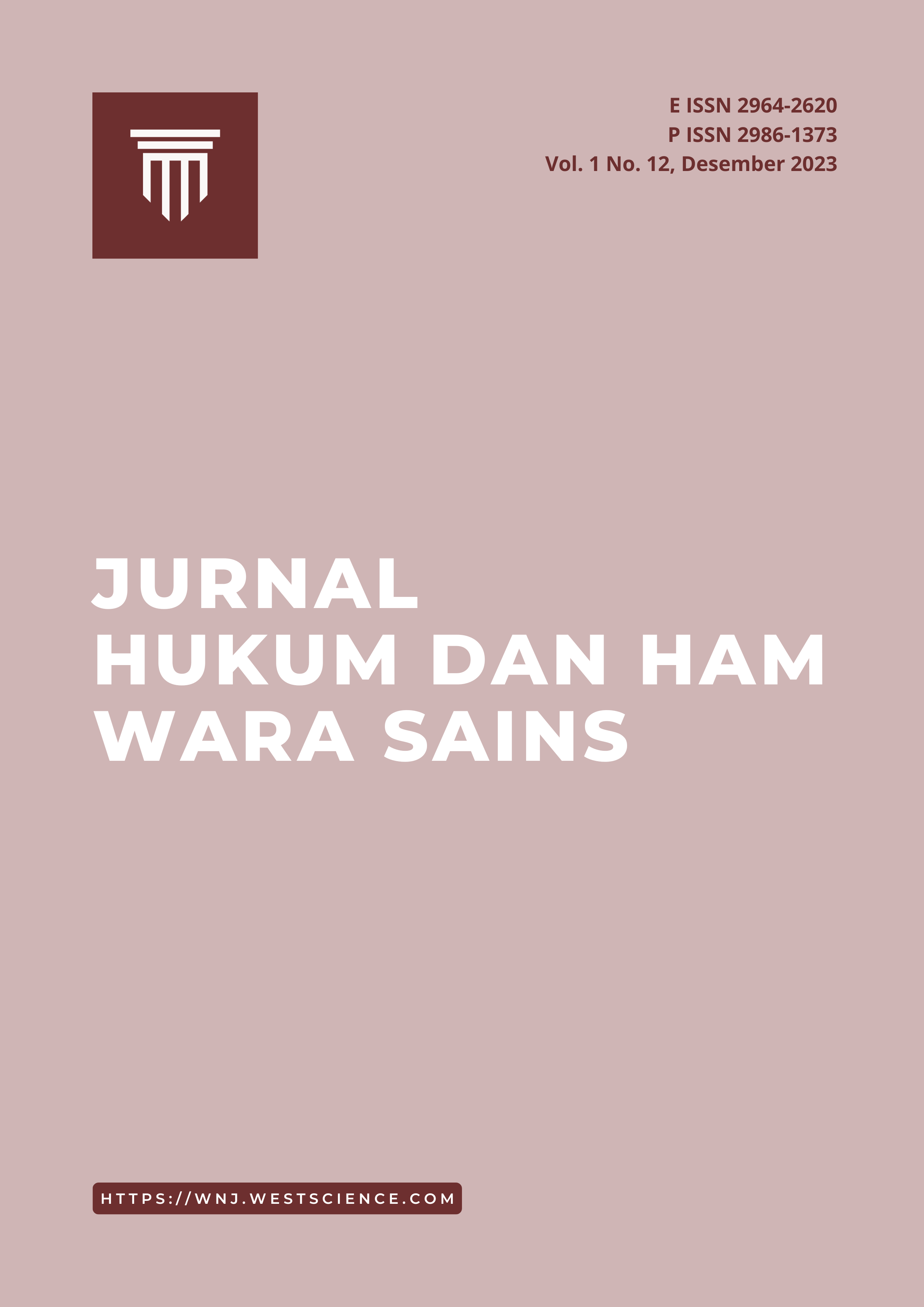Analisis Kebijakan Negara Indonesia dalam Penyelesaian Kasus Pengungsi Rohingya dari Perspektif Masyarakat
DOI:
https://doi.org/10.58812/jhhws.v2i12.870Kata Kunci:
Kebijakan, Negara Indonesia, Kasus Pengungsi, Rohingya, Perspektif MasyarakatAbstrak
Penelitian ini menyelidiki dinamika seputar kebijakan pemerintah Indonesia dalam menangani krisis pengungsi Rohingya dari sudut pandang masyarakat lokal. Dengan menggunakan desain penelitian kuantitatif, survei didistribusikan ke berbagai komunitas yang terkena dampak krisis, mengukur kesadaran, persepsi, dan tantangan yang mereka hadapi terkait dengan inisiatif pemerintah. Hasilnya menunjukkan tingkat kesadaran yang signifikan di antara para responden, dengan 75% mengakui adanya kebijakan pemerintah Indonesia. Perspektif masyarakat yang beragam muncul, dengan 45% merasakan dampak positif, 30% melaporkan dampak netral, dan 25% mengungkapkan sentimen negatif. Studi ini juga mengungkap berbagai tingkat keterlibatan masyarakat, yang menyoroti pentingnya struktur tata kelola yang inklusif. Tantangan yang dihadapi oleh pemerintah dan masyarakat diidentifikasi, yang menekankan sifat multifaset dalam mengelola krisis pengungsi Rohingya. Analisis komparatif dengan standar internasional mengungkapkan bidang-bidang yang selaras dan aspek-aspek yang membutuhkan perhatian. Implikasi terhadap kebijakan dan praktik menggarisbawahi perlunya intervensi yang ditargetkan dan peningkatan keselarasan dengan praktik-praktik terbaik global.
Referensi
Adiputera, Y., & Missbach, A. (2021). Indonesia’s foreign policy regarding the forced displacement of Rohingya refugees: Muslim solidarity, humanitarianism, and non-interventionism. Asia-Pacific Journal on Human Rights and the Law, 22(1), 69–95.
Bülbül, K., Islam, M. N., & Khan, M. S. (2022). Rohingya Refugee Crisis in Myanmar: Ethnic Conflict and Resolution. Springer Nature.
Duran, K. L., Al-haddad, R., & Ahmed, S. (2023). Considering the shrinking physical, social, and psychological spaces of Rohingya refugees in Southeast Asia. Wellbeing, Space and Society, 100152.
Fauzi, W., Solomon, R. V., & Prasojo, E. (2023). CHALLENGES IN IMPLEMENTING GOVERNANCE POLICIES FOR THE PROTECTION OF INDONESIAN MIGRANT WORKERS. International Journal of Innovative Technologies in Social Science, 2 (38).
Georgiou, T., Baillie, L., & Shah, R. (2023). Investigating Concerns of Security and Privacy Among Rohingya Refugees in Malaysia. ArXiv Preprint ArXiv:2304.01617.
Haines, R., & Buchanan, C. (2023). The localisation discourse in post-2021 Myanmar: implications for conflict sensitivity. Development in Practice, 1–8.
Höllermann, B. (2023). Impact of interplay of perceived environmental and socio-political uncertainties on adaptation decisions. Copernicus Meetings.
Hospodaryk, V. (2023). Male and Gender-Diverse Victims of Sexual Violence in the Rohingya Genocide: The Selective Narrative of International Courts. International Journal of Transitional Justice, 17(2), 252–267.
Hossain, M. P. (2023). Criminology of Atrocity Crimes: Analysing the Aetiology of the Rohingya Persecution in Myanmar. International Annals of Criminology, 61(1), 43–65.
Irom, B. (2023). Visual themes and frames of the Rohingya crisis: newspaper content from three countries neighboring Myanmar. Visual Communication, 14703572231173076.
Islam, M. S., & ŞAHİN, A. (2023). Impact of Forcibly Displaced People’s Identity Crisis on Host State‟ s Security: The Case of Rohingya Refugees in Bangladesh. Saudi J. Humanities Soc Sci, 8(4), 80–91.
Lester, H., Ryakhovskaya, Y., & Olorunnisola, T. S. (2023). Asset-based community development approaches to resilience among refugees and recent migrant communities in Australia: a scoping review. International Journal of Migration, Health and Social Care.
Loureiro, M., Joshi, A., Barnes, K., & Chaimite, E. (2023). Governance Diaries: An Approach to Researching Marginalized People’s Lived Experiences in Difficult Settings. International Journal of Qualitative Methods, 22, 16094069221150106.
Milhorance, C., Bursztyn, M., & Sabourin, E. (2022). Analysing complex policy problems: a critical review of the literature. International Journal of Public Policy, 16(2–4), 126–150.
Nalini, S. N. L. (2021). Dampak Dampak covid-19 terhadap Usaha MIkro, Kecil dan Menengah. Jesya (Jurnal Ekonomi & Ekonomi Syariah), 4(1), 662–669. https://doi.org/10.36778/jesya.v4i1.278
Nilsen, M., Olney, J., Maung, K., Karim, L., Ahmad, S., Haque, N., & Mubarak, H. R. (2023). Community-Led Education among Rohingya Refugees and the Politics of Refugee Education in Bangladesh. Journal of Refugee Studies, 36(4), 712–735.
Rachmat, A. N. (2022). Peluang Dan Tantangan Kepemimpinan Indonesia Dalam Bidang Politik-Keamanan Di ASEAN Pada Krisis Politik Myanmar Tahun 2021. Dinamika Global: Jurnal Ilmu Hubungan Internasional, 7(02), 180–200.
Seftyono, C. (2022). Kelindan Noise dan Voice menjadi Choice: Komunikasi Sains dalam Implementasi Kebijakan Berbasis Bukti Penanganan Pandemi COVID-19 di Indonesia. Universitas Gadjah Mada.
Shohel, M. M. C., Ashrafuzzaman, M., Babu, R., Akter, T., Tasnim, N., & Bayezid, A. (2023). Access to Higher Education for the Rohingya Refugees: Challenges, Opportunities, and Future Directions. Global Perspectives on the Difficulties and Opportunities Faced by Migrant and Refugee Students in Higher Education, 103–135.
Suwandari, H. D., & Sugito, S. (2021). The Strategy of Indonesian Diplomacy Efforts and National Political Interests in the Ethnic Rohingya Refugee Conflict. Indonesian Journal of Economics, Social, and Humanities, 3(2), 131–143.
Syahrin, M. A., Wiraputa, A. R., & Ponco Aji, K. (2022). Indonesian Legal Policy in Treating International Refugees Based on Human Rights Approach. Law and Humanities Quarterly Reviews, 1(4).
Takemura, H. (2023). Background to the Rohingya Crisis. In The Rohingya Crisis and the International Criminal Court (pp. 11–26). Springer.
Ullah, A. N. Z., Pratley, P., Islam, S., Islam, K., & Roy, T. (2023). Exploring Mental Health Status and Psychosocial Support among Rohingya Refugees in Bangladesh: A Qualitative Study. Mental Illness, 2023.
Wicaksana, I. G. W., & Karim, M. F. (2022). Approaches to Indonesia’s Foreign Policy: Area Studies, FPA Theory, and Global IR. JAS (Journal of ASEAN Studies), 10(2).
Wisesa, A. R., & Salam, R. (2023). Analysis of New Autonomous Regional Policies in Indonesia. INFLUENCE: INTERNATIONAL JOURNAL OF SCIENCE REVIEW, 5(2), 297–314.
Unduhan
Diterbitkan
Cara Mengutip
Terbitan
Bagian
Lisensi
Hak Cipta (c) 2023 Syarifuddin Syarifuddin, Anang Sugeng Cahyono, Rival Pahrijal

Artikel ini berlisensiCreative Commons Attribution-ShareAlike 4.0 International License.



















 Instagram
Instagram 